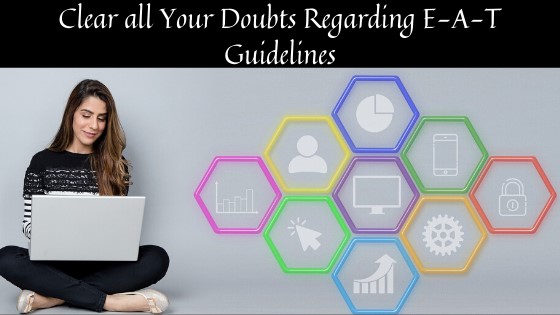EAT SEO : You might have recognised that Google’s algorithm is created to judge whether the crawled content is trustworthy and of high-quality or not.
But, you might have not noticed that Google has a team of actual people who ensures that the things are falling at its place.
Google has a team of contractors who examines the accuracy of the algorithm by performing the searches manually.
For example; contractor would be searching about the best SEO company in Sydney like any other common person.
The people who check this algorithm are known as Quality Raters.
They have to perform a list of random searches like “which car to buy in 2020”? Then they check the quality of each website which is at the top of the search results.
These Quality Raters are given rigorous training and they have the knowledge about how the search result must look like.
Google has created a Search Quality Rating Guidelines which has to be followed by Quality Raters while performing their task.
The main principles implemented in the assessment process also include acronyms like EAT: Expertise, Authority, and Trustworthiness.
This acronym came to the picture a long time ago, but was not implemented and discussed until the year 2018.
Google came with a fresh update in 2018 known as the Medic Update.
According to the update, the higher rank would be given to those websites that published reputable, well-researched, and relevant content.
Only after this update, webmasters recognised the importance of creating unique content.
More emphasis was given to the E-A-T SEO when Google made it clear about how content quality will be the top-most priority in its Search Quality Rating Guidelines in May 2019.
What is E-A-T?

The full-form of E-A-T is Expertise, Authority, and Trustworthiness.
This concept was created by Google to provide a standardised method to the third party raters to judge search results so they can use this standard instead of imposing their personal opinions.
Personal opinions would make ratings totally unreliable, that is why the concept of E-A-T was created by search engine star Google.
However, the search quality raters guidelines and the concept of E-A-T is not a representation of Google’s algorithm.
Now let us learn more about the E-A-T principle:
Expertise
The author of the content must have 2x more knowledge about the topic than others.
The quality raters would judge the topic on the basis of the author’s experience on the topic.
It does not indicate that the author needs to have a formal education regarding the topic. Keen interest in the topic with relevant information includes the quality of expertise in the write-up.
Authority
The author must have extensive knowledge of the industry.
Google’s quality raters are not going to search for the twitter followers of the authors, but they will see the author have authority and knowledge on a particular subject.
The website must have received awards on the subject.
People will only link to your subject if it is authoritative.
Trustworthiness
How to judge whether the content is trustworthy or not? For that, you would need proof!
Quality Raters measures integrity while examining the website.
They focus more on editorial policies, privacy policies, and various security updates.
Google’s quality raters employ this acronym to confirm that Google is not ranking the low-quality website above rich websites.
People will link to your website, talk more about the site on social media only when your website has satisfied the maximum user base.
Such simple information can be the best way to ascertain that the information, products, and services can be trusted.
Authority and Links
There are other determinants like links that have been used to create expertise, authority, and understanding pertaining to the user’s point of view.
For example, if a web page receives various links from several web pages in a particular topic, this indicates the authority of the website.
It is not true to pass a judgement that the site has authority because it has many links from several websites.
Rank always Displays the User Needs
One cannot deny the fact that Google search results have content which is expected by the users in their search query.
Google research papers have incorporated content analysis, natural language processing, and link analysis which revolves around learning about the needs of users.
- Links can guide an expert page in the domain.
- Links drive to a web page which is trusted by humans.
- Also, links help Google to examine which pages are called authoritative according to human interaction with the page.
- Optimising for Expertise
Expertise is a concept which is influenced by opinion.
It is not relevant to optimize the website on the basis of opinion or judgement that your content has some expertise.
Expertise is a subject which is completely subjective and it is a matter of opinion.
There are no clear parameters pertaining to expertise.
Optimisation for Authority
Metrics for authority can be links that lead to your site.
There are no more indicators which clearly determines the authority of the website.
Authority is a well-known concept and it is not an actual factor that is used by Google, other than PageRank.
Also, there are no separate metrics for trustworthiness.
Optimization for a Concept
You can also increase authoritativeness, expertise, and trustworthiness by focusing on excellence in the domain.
This is just perceptions and descriptions of the site and content, you cannot simply optimise the site by adding alt text to the image.
There is no Serious Relationship between Google’s Algorithm and Quality Raters Guidelines
There are no ranking factors mentioned in the Quality Raters Guidelines
The QRG is created to guide the third party control raters to use similar methods to evaluate SERPs rather than using personal opinions and different standards.
Webmasters can employ QRG as a reputed model to judge their website.
But it is not the ultimate formula that is reflected in Google’s algorithm. That’s it!
The changes that are announced by Google are more focused on understanding the on-page content and user queries.
You can surely take inspiration through this transformation.
Also, adding the author bio will not make any relevant changes.
The SEO industry must stop focusing more on these fictitious factors such as E-A-T.
To really be at the top of this ranking game, it is important to concentrate on creating content that adds value to the users and you will be able to attract more and more audiences. For any further assistance, you must take help from the best SEO company in Melbourne.




